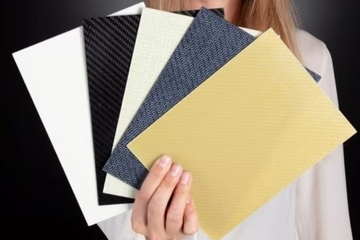ENVALIOR
Launch of high-performance composites, sustainable PBT compounds / Producer announces sustainability ambitions
— By Plasteurope.com correspondent —
German engineering materials supplier Envalior (Cologne; www.envalior.com), created as a high-performance materials JV between Lanxess and Advent International, has announced the launch of several new products. Within its Tepex range of continuous fibre-reinforced thermoplastic composites, the company has introduced materials based on PEI, PPS, PA 4.6 and 4.10, and thermoplastic copolyester elastomers. Joining its Pocan series of PBT compounds, the producer launched grades based on bio-circular BDO.
German engineering materials supplier Envalior (Cologne; www.envalior.com), created as a high-performance materials JV between Lanxess and Advent International, has announced the launch of several new products. Within its Tepex range of continuous fibre-reinforced thermoplastic composites, the company has introduced materials based on PEI, PPS, PA 4.6 and 4.10, and thermoplastic copolyester elastomers. Joining its Pocan series of PBT compounds, the producer launched grades based on bio-circular BDO.
 Applications for the company’s new Tepex materials include aviation and railway vehicles, sporting goods, and heat-exposed housings (Photo: Envalior) |
Envalior said its new Tepex composites based on PEI and PPS have respective heat deflection temperatures of 210°C and 275°C. Suitable to substitute metals in moving parts, the German producer expects the two ranges to be compliant with “most current industrial standards for components in aircraft and railway vehicles”. In addition, the PEI-based variant can be used in 3D printing.
Tepex composites based on the company’s EcoPaxx polyamide 4.10 feature high scratch resistance, low water absorption, and good melt flowability, which makes them suitable for heat-exposed housings, the company said. Envalior noted that around 70% of the matrix of these materials are made from raw materials derived from castor oil, with a 50% lower carbon footprint compared with fossil-based PA 6.6.
Materials based on the company’s Stanyl PA 4.6 have operating temperatures of up to 220°C and are highly resistant to wear and abrasion. Suitable for moving parts, Envalior noted that application areas include metal substitution for components such as gear wheels and coil carriers.
Finally, Tepex composites based on TPC-E from the company’s Arnitel range have a wide hardness range in addition to thermal stability and consistent properties including high tensile strength and abrasion resistance across a temperature spectrum of -45°C to 150°C. Applications include sporting goods production, in particular components for shoe soles.
Envalior also noted the lightweighting benefits of its Tepex range for automotive applications. A grade from the series was recently used for the first time in the production of roof crossmembers for convertibles, substituting the previously used magnesium. In addition to saving weight, the replacement used only 50% of the necessary component.
Tepex composites based on the company’s EcoPaxx polyamide 4.10 feature high scratch resistance, low water absorption, and good melt flowability, which makes them suitable for heat-exposed housings, the company said. Envalior noted that around 70% of the matrix of these materials are made from raw materials derived from castor oil, with a 50% lower carbon footprint compared with fossil-based PA 6.6.
Materials based on the company’s Stanyl PA 4.6 have operating temperatures of up to 220°C and are highly resistant to wear and abrasion. Suitable for moving parts, Envalior noted that application areas include metal substitution for components such as gear wheels and coil carriers.
Finally, Tepex composites based on TPC-E from the company’s Arnitel range have a wide hardness range in addition to thermal stability and consistent properties including high tensile strength and abrasion resistance across a temperature spectrum of -45°C to 150°C. Applications include sporting goods production, in particular components for shoe soles.
Envalior also noted the lightweighting benefits of its Tepex range for automotive applications. A grade from the series was recently used for the first time in the production of roof crossmembers for convertibles, substituting the previously used magnesium. In addition to saving weight, the replacement used only 50% of the necessary component.
PBT compounds with sustainable raw materials
Envalior has further announced the launch of a new range of Pocan PBT compounds. The feedstock BDO is produced using cooking oil as a raw material. The resulting BDO is chemically and physically identical to the fossil-based variant, the company said, adding that it can be used as a drop-in substitute.
Related: Envalior completes expansion of compounding in China
The German engineering materials supplier noted that the PBT base polymer of its new Pocan X-MB material has a mass-balanced, ISCC Plus-certified sustainable content of 26% and a 30% reduced carbon footprint compared with the equivalent standard compounds.
Pocan X-MB is offered in variants with glass fibre content of 20% and 30% and is suited to a range of automotive, consumer goods, and E&E applications.
Related: Envalior completes expansion of compounding in China
The German engineering materials supplier noted that the PBT base polymer of its new Pocan X-MB material has a mass-balanced, ISCC Plus-certified sustainable content of 26% and a 30% reduced carbon footprint compared with the equivalent standard compounds.
Pocan X-MB is offered in variants with glass fibre content of 20% and 30% and is suited to a range of automotive, consumer goods, and E&E applications.
Sustainability initiative launched
In separate news, Envalior announced that it has joined the United Nations Global Compact, a non-binding corporate sustainability initiative, in addition to launching its own Sustainability Ambitions initiative as part of its effort to decrease greenhouse gas emissions by 100% by 2040.
The company said it also looks to reduce its greenhouse gas emissions by 75% by 2030, achieve 100% renewable electricity by 2030, and offer an entire portfolio of bio-based or recyclate-based material alternatives by 2030.
The company said it also looks to reduce its greenhouse gas emissions by 75% by 2030, achieve 100% renewable electricity by 2030, and offer an entire portfolio of bio-based or recyclate-based material alternatives by 2030.
26.11.2024 Plasteurope.com [256606-0]
Published on 26.11.2024
